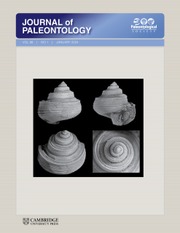Article contents
Ontogeny and ventral median suture of the ptychaspidid trilobite Asioptychaspis subglobosa (Sun, 1924) from the Furongian (Upper Cambrian) Hwajeol Formation, Korea
Published online by Cambridge University Press: 14 July 2015
Abstract
The order Asaphida has been characterized by the possession of a globular protaspis and a ventral median suture. the superfamily Dikelocephaloidea was included in the Asaphida, although there has been no reliable ontogenetic information for this superfamily, and thus whether dikelocephaloids had a protaspis of globular shape has remained unclear. the ontogenetic study of the dikelocephaloid trilobite, Asioptychaspis subglobosa, from Korea reveals that the protaspis of A. subglobosa is not of globular morphology but of general benthic adult-like morphology, heralding that the Dikelocephaloidea may not be closely related to other trilobite groups within the Order Asaphida. This protaspid morphology is clearly distinguished from the highly globular protaspis of the Remopleuridioidea, which has been considered the sister group to the Dikelocephaloidea. in addition, the ontogenetic development of the free cheeks shows that A. subglobosa possessed anteriorly yoked free cheeks during the early phase of development but formed a ventral median suture by splitting the yoked cheeks in the later phase of ontogeny. This contrasts with the previously suggested mode of ventral median suture formation of the Order Asaphida. This alternative mode of ventral median suture formation of A. subglobosa, along with non-asaphoid protaspid morphology, warrants removal of the Dikelocephaloidea from the current Order Asaphida. This study further demonstrates that the ventral median suture did not evolve only once in the evolutionary history of trilobites. With the addition of the mode here documented for Asioptychaspis, the ventral median suture is now known to have developed independently and in a different fashion at least three times in the history of Cambrian trilobites.
- Type
- Research Article
- Information
- Copyright
- Copyright © The Paleontological Society
References
- 15
- Cited by


